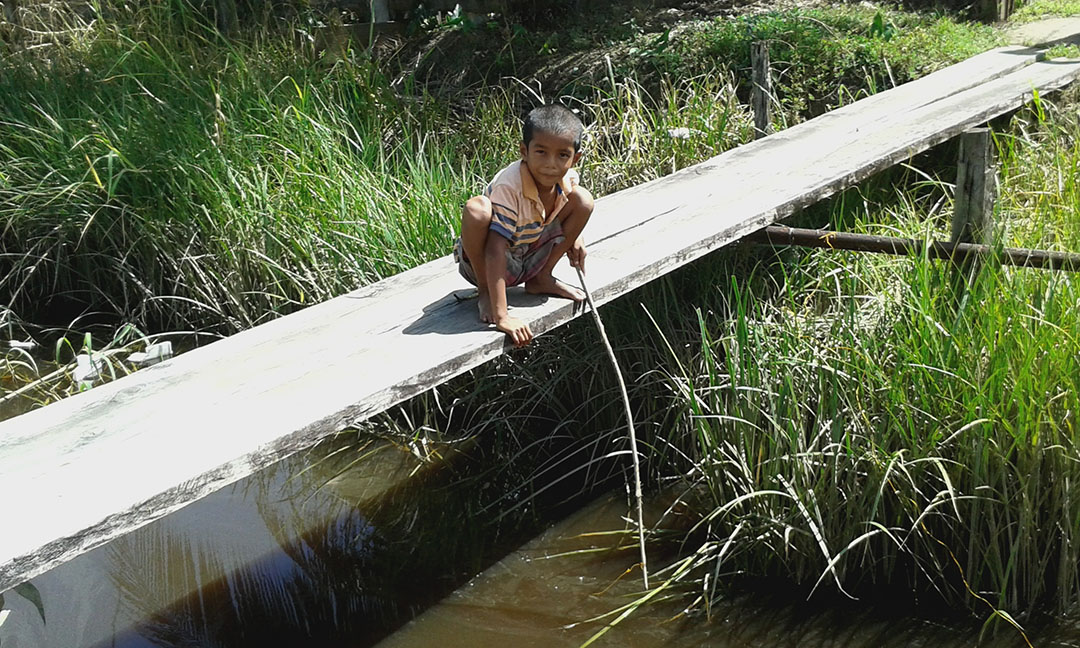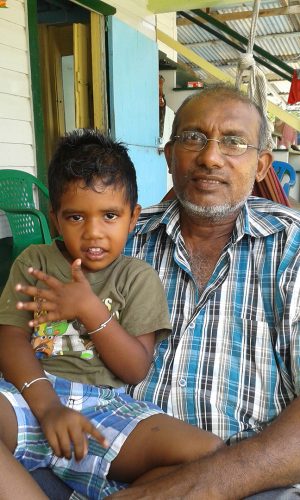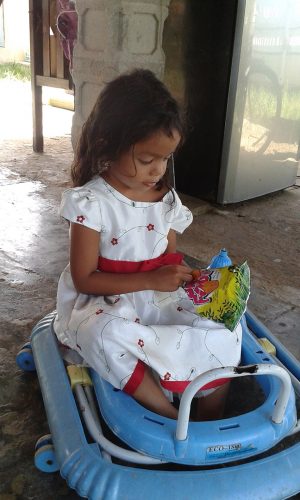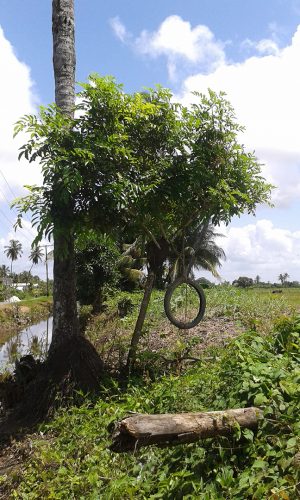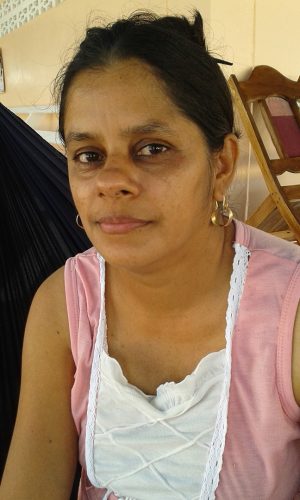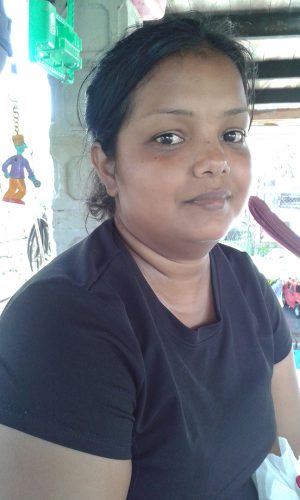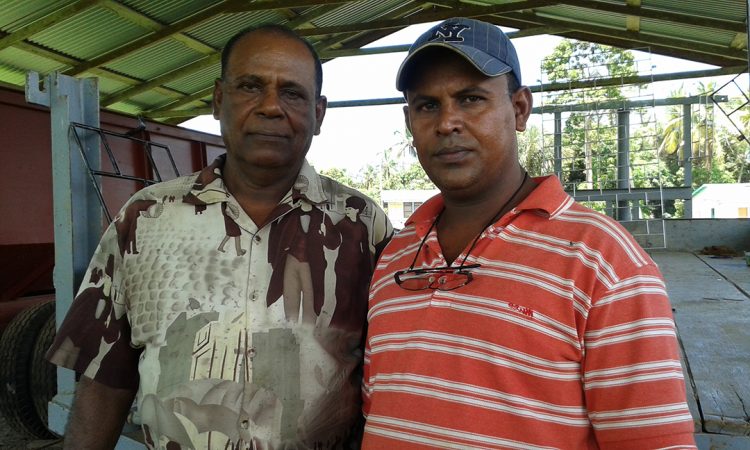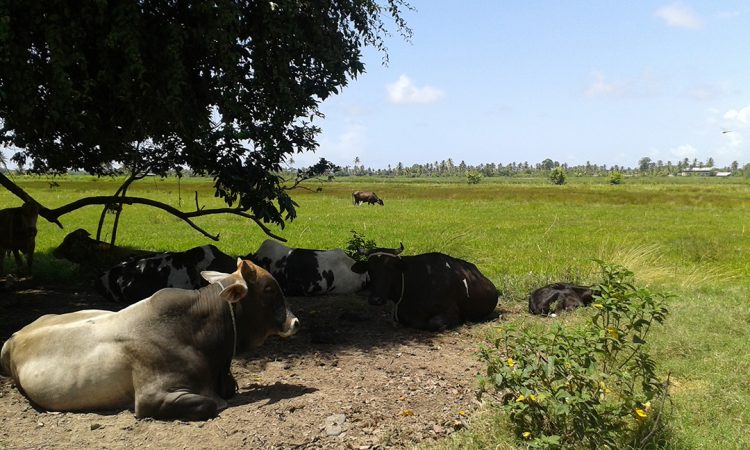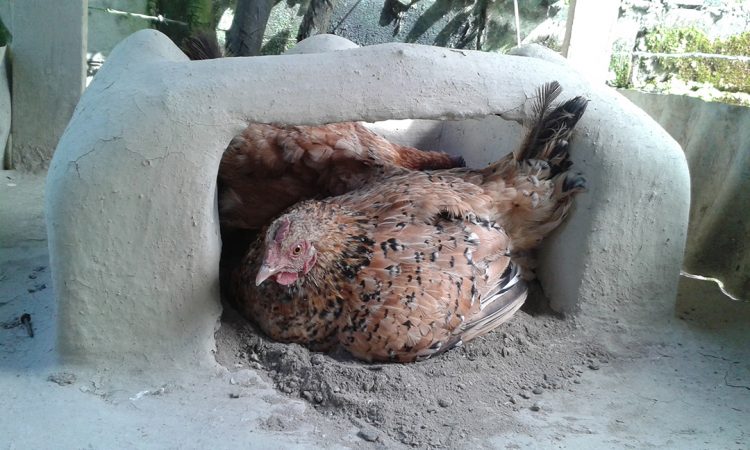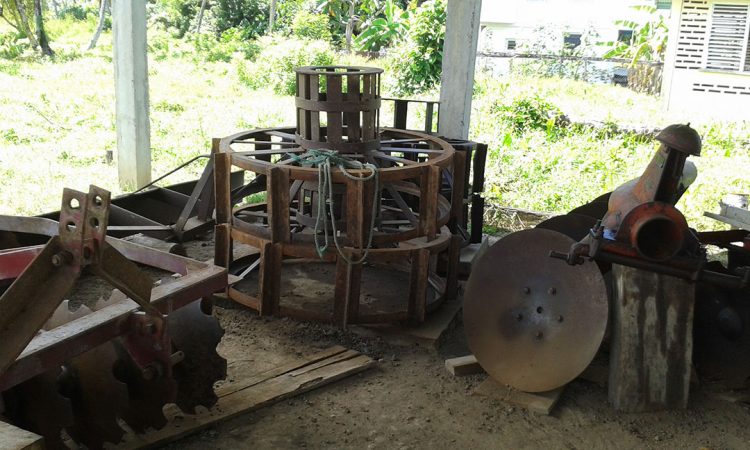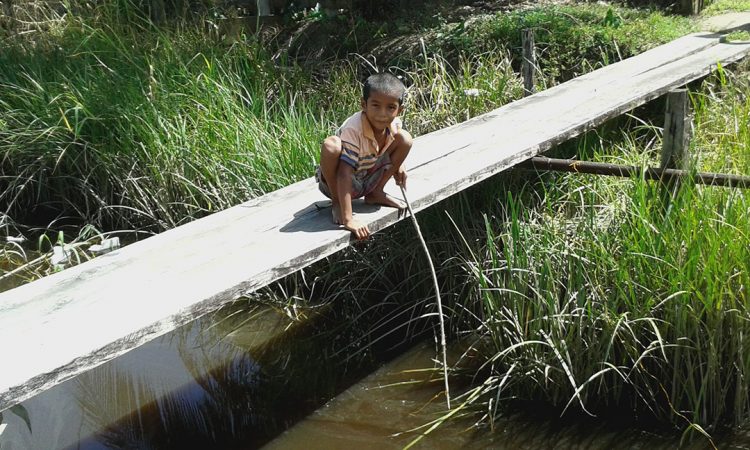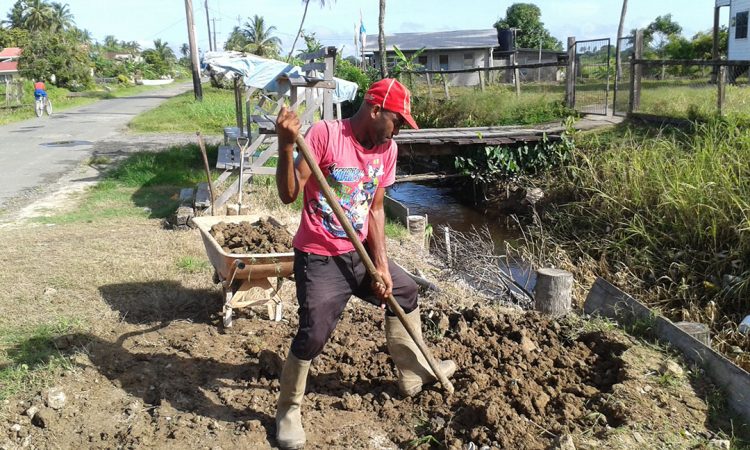Arthurville is a tiny village on the island of Wakenaam, of not more than 60 people. It is just 2.8 miles from the Wakenaam Stelling. To get to Wakenaam, one must travel to Parika and then either take the ferry, which leaves at 5 pm and returns the next day at 5 am, or take a speedboat. The trouble is, as I learned, speedboats do not leave without a full complement of passengers. It took two tries. The first involved a three-hour wait and a retreat after it got too late. On the second occasion, there were no Wakenaam boats at Parika, so I took one to Supenaam. There, I found an elderly couple at the stelling awaiting a speedboat for Wakenaam. A short wait and three more passengers later we were on our way.
There are taxis that take you around the island and you can ride alone for $500 a drop or share the car and pay $300.
Having begun my journey at 6 am, it was still only 8 am when I arrived at Arthurville and persons were busy getting their morning chores done.
Kamila Jainarine was multitasking, tending to chores and children at the same time. She was born at Free and Easy, another village on the island, and moved to Arthurville after she got married in 2009. Arthurville, she stated, is “a bit brighter” than Free and Easy, because it is situated at the front of Wakenaam.
Arriving at Arthurville, she shared, she met a place where people roamed the streets, cars passed by every hour and music was belted from neighbouring houses. Life is easier, she said, as so much more is accessible. However, whenever she wants to visit her relatives in Free and Easy, she has to find $2,000 to pay a taxi for a half-an-hour drive.
She likes that Arthurville is crime free with some of the friendliest people. The residents are mainly Afro and Indo Guyanese, she noted, but there are no problems with race; they live as one.
At the time of my visit, Jainarine was in the company of her two young children; her husband was away at sea. She explained that her husband, who was a rice farmer, has abandoned the farm because what he was getting for the paddy he sold could not cover his expenses or pay his workers. She said this was his first venture out to sea and the hope was that it would be profitable.
“He won’t be planting back even when is crop,” she explained, “unless the paddy price raise. You think is easy wasting yuh time and labour and money? First we used to get $3,500 a bag, about two year gone back, now we only getting $1,700 a bag.”
Because of this same issue, they have talked of the family leaving the island, she said, but that is not settled.
Jainarine, who is Hindu, said the village has no place of worship. The temple there has been closed for a long time now. There is one a short distance away at Maria Johanna.
Nearby, Danpattie Singh was busy cobwebbing the downstairs of her house. She has been a resident of Arthurville for 26 years, and having moved from the village across the main road, Nooitgedacht, she has a fair idea of the village.
As a little girl she attended Arthurville Primary then the Essequibo Island Secondary which was in Fredericksburg and was later relocated to Sans Souci.
“Long ago we used to walk to school. The island had no transportation. Many years ago the children who were travelling from far to reach to school, used to get there on tractors and trailers. People today use motorbikes,” Singh said.
Although almost every plot of land has a house on it, not all of the houses are occupied. This, she explained, came about because on completing school, several young people leave the island in search of jobs or higher education and more often than not their parents leave with them. Her own children, she said, left to further their studies.
Though she’s quite contented with her village saying she loves the quiet and peaceful atmosphere of it she had two disadvantages she wanted to touch on.
First was the issue of the speedboats and the hours of waiting for them to fill up before they can leave Parika. “The problem is not getting a boat to go [to Parika] but when you ready to come back is the problem, sometimes you not getting a boat,” she stressed. She further explained that there are two boat services that run the Parika/Wakenaam route, but as the “turn system” was introduced and they now have to wait until the boat is full whereas before the boat left once it had a group of persons. She is hoping that the operators use smaller boats to help with this issue.
The second was a request that the Neighbourhood Democratic Council (NDC) fog out the island because of the mosquitos which are too much of a nuisance.
Between all the pounding and welding I was able to talk with Sasenarine Latchman. His parents moved to Arthurville when he was two years old; he has lived there for 41 years.
He first started working alongside his father in the backdam at just ten years old. Even today he his father worked on some window grills as we spoke. “In those days we used to walk to the backdam a mile and a half.
We were very poor, we use to use grass knife [to harvest rice], now we got machines to do the job,” he said. The family now own a rice, provision and coconut farm. “Coconut got good price but the price for provision fluctuating,” he said. “Like how school close now, you ain’t really making a profit on provision; it very small. Rice though, rice coming to a close on the island. We don’t have no buying centre or mill on the island so we have to take it over to the coast and it’s costly. Sometimes we have to wait four/five months before [being] paid [for paddy sold]. The island once planted 4,800 acres in rice up to the ending of 2014 and now it’s less than 1,000. We invested in a lot of land and cattle but it’s not working out so we’re forced to migrate, so we are leaving,” the man said. He explained that was the reason they were making grills – to secure his windows before they left. Nearby, combines lay rusting. They have been left there a while now as there is no use for them anymore.
Latchman also complained about the turn system. “We had two very good speedboat service; they never used to wait to full and used to bring passengers once they got a set but now this year they started working by the turn system…. Sometimes this takes an entire day. Sometimes all you want is one thing from Parika and you got to wait all day. If they want to work the turn system, they have to use smaller boats. This system mess up the whole of Wakenaam,” he said.
He wants to see development and better roads. He highlighted a plantain chip factory which was being set up by the previous government sometime between 2013 and 2014, which has since stopped. He noted that Leguan now has a plantain chip factory underway, although Wakenaam produces more plantains. He also wants the stelling to be fixed so that the roll-on/roll-off ferry that travels to Supenaam can make stops there.
At the very head of the village Zakir Khan sat in his hammock enjoy the island breeze. He is the former NDC chairman (1996-2016) and is currently the president of the Sans Souci Masjid.
“This Arthurville Estate was owned by the Walkers,” he recalled. “I assume they were British. They later sold it… Many of the persons who are owners of plots of land would have migrated from Tiger [Hamburg] Island.” No one lives on Tiger Island anymore, he said, but Wakenaam residents go there to picnic, particularly in August.
Khan, who was born in Arthurville, said he loved being able to go to bed at night leaving his windows and doors open. “Just as you see everything in this yard, just so it remains when we wake up the next day,” he noted.
Being a man of the people, he would like to have a vocational centre for the youth. He expects that this would occupy youths’ idle time, while teaching them skills and not only Arthurville would benefit from this, but the other villages around.
There was a time, he said, when the school had Home Economics and Industrial Arts departments and housed the community centre as well. All of the primary schools across the island as well as the Essequibo Island Secondary, had different schedules and attended classes at selected times. This, however, stopped functioning in the 1980s.
A farmer, Khan plants bananas and plantains and rears cattle, poultry and sheep. “It’s a challenge to make ends meet,” he said. “Prices are fluctuating and as for rice, rice has disappeared. We don’t have millers buying and we have to take our paddy off the island which is $400, which is our profit. Take that from $1,700, then the remainder has to cover chemicals and labour expenses, we’re left with almost nothing. Arthurville is mainly rice farming… and right now we only have 75 acres planted for this crop.”
Nearby, his cattle graze in his former rice fields, which were converted to pastureland since he gave up rice farming. He is saddened by these changes.
Speaking of the ongoing migration of the people of Arthurville, Khan said that though some children leave to further their studies they often never return. The few who remain, work on the farms.
Khan plans on staying put. The village has potable water and electricity. Villagers use the Digicel service as the GTT signal is difficult to get. He added that currently plans are in place to put in two culverts so as to drain off excess water from the western part of the village.
